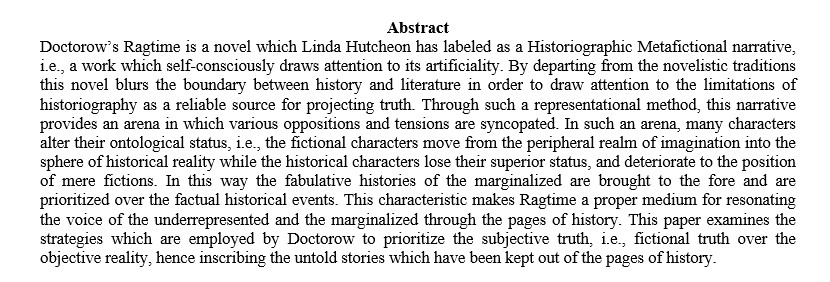Fabulative Histories and Syncopated Voices in Doctorow's RagtimeA part of PhD dissertation entitled as;Histories Revisited: A New Historicist Reading of Doctorow’s Ragtime, Pynchon’s Mason and Dixon and Mitchell’s Cloud Atlas
##semicolon##
https://doi.org/10.21271/zjhs.27.SpA.29##semicolon##
Historiographic Metafiction##common.commaListSeparator## , Postmodernism ##common.commaListSeparator## Historicism##common.commaListSeparator## Parody##common.commaListSeparator## Syncopation.پوختە
Doctorow’s Ragtime is a novel which Linda Hutcheon has labeled as a Historiographic Metafictional narrative, i.e., a work which self-consciously draws attention to its artificiality. By departing from the novelistic traditions this novel blurs the boundary between history and literature in order to draw attention to the limitations of historiography as a reliable source for projecting truth. Through such a representational method, this narrative provides an arena in which various oppositions and tensions are syncopated. In such an arena, many characters alter their ontological status, i.e., the fictional characters move from the peripheral realm of imagination into the sphere of historical reality while the historical characters lose their superior status, and deteriorate to the position of mere fictions. In this way the fabulative histories of the marginalized are brought to the fore and are prioritized over the factual historical events. This characteristic makes Ragtime a proper medium for resonating the voice of the underrepresented and the marginalized through the pages of history. This paper examines the strategies which are employed by Doctorow to prioritize the subjective truth, i.e., fictional truth over the objective reality, hence inscribing the untold stories which have been kept out of the pages of history.
سەرچاوەکان
Aristotle. Poetics. In Aristotle: Poetics; Longinus: On the Sublime; Demetrius: On Style. Trans. W. HamiltonFyfe. Cambridge, MA and London: Harvard University Press/Heinemann, 1965.
Clayton, John. (1983) “Radical Jewish Humanism: The Vision of E. L. Doctorow”. in Essays and Conversations, ed. Richard Trenner,109-119. New Jersey: Ontario Review Inc.
Cuddon, J. A., & Preston C. (2013). A Dictionary of Literary Terms and Literary Theory. Oxford, UK, Blackwell.
Doctorow, E. L. “False Documents” In E. L. Doctorow: Essays and Conversations. ed. Richard Trenner, 16-27. Princeton, N.J.: Ontario Review Press, 1983.
Doctorow, E. L. (1975). Ragtime. New York, Random House, Modern Library Edition.
Doctorow, E. L. “E. L. Doctorow: ‘I Saw a Sign,’ ” , Interviewed by Victor S. Navasky, New York Times Book Review. 28 September 1980, p. 44.
Brogan, Hugh. “Rudyard Kipling on America.” Journal of American Studies 7, no. 1 (1973): 31–46. Accessed on December 25 2022.
http://www.jstor.org/stable/27553033.
Foley, Barbara. “From U.S.A. to Ragtime: Notes on the Forms of Historical Consciousness in Modern Fiction.” American Literature 50, no. 1 (1978): 85–105. Accessed on July 15, 2022. https://doi.org/10.2307/2925523.
Fowler, D., (1992) Understanding E.L. Doctorow, South Carolina: University of South Carolina Press.
Gross, David S. “Tales of Obscene Power: Money and Culture, Modernism and History in the Fiction of E. L. Doctorow.” In E.L. Doctorow, Essays and Conversations. 120-150. Princeton, N.J.: Ontario Review Press. 1983.
Gussow, Mel. "Novelist Syncopates History in Ragtime ." The New York Times 11 July 1975: 12.
Harris, Stephen. “Myths of Individualism in E.L. Doctorow’s ‘Ragtime.’” Australasian Journal of American Studies 20, no. 2 (2001): 47–61. Accessed on December, 10, 2022. http://www.jstor.org/stable/41053867.
Hutcheon, Linda. "The Postmodern Problematizing of History." ESC: English Studies in Canada 14, no. 4 (1988): 365-382. Accessed on August 25, 2022. doi:10.1353/esc.1988.0057.
Hutcheon, L. (1988) A Poetics of Postmodernism: History, Theory, Fiction. New York: Routledge, Taylor & Francis e-Library.
Levine, Paul. (1985) E. L. Doctorow. New York: Routledge, Routledge Library Editions: Modern Fiction.
Nietzsche, Friedrich. (1954) The portable Nietzsche. Translated by Walter Kaufmann, New York, The Wiking Press, 1954.
Ostendorf, Berndt. “The Musical World of Doctorow’s Ragtime.” American Quarterly 43, no. 4 (1991): 579–601. Accessed on May, 14, 2022 https://doi.org/10.2307/2713082.
Parks, John G. (1991) E.L. Doctorow. New York: The Continuum Publishing Company.
Parks, John G. “The Politics of Polyphony: The Fiction of E. L. Doctorow.” Twentieth Century Literature 37, no. 4 (1991): 454–63. Accessed on June 25, 2022. https://doi.org/10.2307/441658.
Ryan, Marie-Laure. “Postmodernism and the Doctrine of Panfictionality.” Narrative 5, no. 2 (1997): 165–87. Accessed on March 7, 2023. http://www.jstor.org/stable/20107114.
Scholes, Robert. (1979) Fabulation and Metafiction. Urbana: University of Illinois
McCaffery, Larry. “A Spirit of Transgression.” In E. L. Doctorow: Essays and Conversations. ed. Richard Trenner, 31-47. Princeton, N.J.: Ontario Review Press. (1983).
Wesseling, Elizabeth. (1991) Writing History as a Prophet: Postmodernist Innovations of the Historical Novel. Editorial Board : Douwe Fokkema (chair) Joost Kloek, Sophie Levie - Willie van Peer, Bernhard F. Scholz, Amesterdam: John Benjamins Publishing Company.
Wilder, Alec. (1972). American Popular Song; the Great Innovators, 1900-1950. Ed. James T. Maher, New York: Oxford University Press.
Wright Derek, “Ragtime Revisited: History and Fiction in Doctorow’s Novel” in International Fiction Review, Vol. 20, No 1, (1993), 14-16. Northern University

##submission.downloads##
بڵاو کرایەوە
ژمارە
بەش
##submission.license##
##submission.copyrightStatement##
##submission.license.cc.by4.footer##








